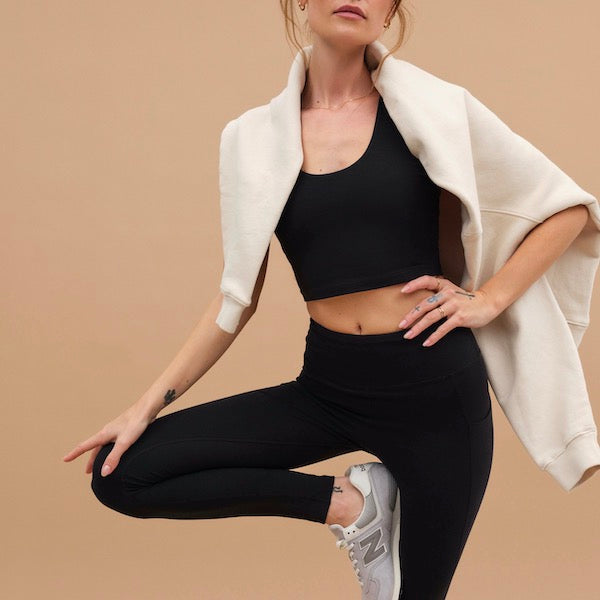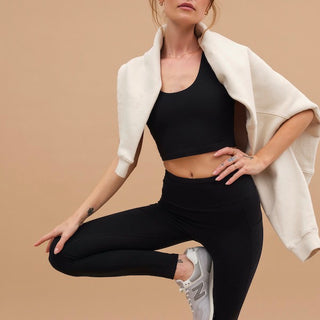Your Tote (0)
Organic Choices For You
2020 Impact Report
The MATE Manifesto
We believe that what you wear directly impacts your wellness, and how clothes are made changes the earth we walk on, the air we breathe.
We believe the best-dressed women wear their values on their sleeves, find confidence in comfort, beauty in community, and strength in their own skin.
Dress Clean™

Here's how we put our words into action in 2020:
Planet
We believe fashion is not simply an industry but an ecosystem.
Looking back on our environmental impact over the last year is an essential part of seeing both our progress and areas for improvement. Where we are today is not perfect but we are doing everything we can to create a more sustainable model for clothing production and give back to the planet that provides the resources that make our business possible.
In 2020 we launched our partnership with 1% For the Planet and donated over $95,000 to environmental and social justice organizations that are working to heal our planet and our people. Think of this like a tax we are putting on ourselves to make up for our supply chain’s impact each year.
Our 2020 Environmental Impact:
Alright MATE, let’s talk impact. Anytime anything is made there is environmental impact; we can do all the good things but that’s the truth. In this section we want to walk you through the impact of our products from materials to production, transportation, and packaging. There will be some things we are proud of and things we are working on. Let’s take a deep breath and dive in.
Our Materials:
We carefully select the fabrics we use in our garments because they determine a large portion of the environmental footprint of our clothing. That’s why we keep it Organic, essential, and ethical. Let’s take a tour of our fabrics. Listed below is the average carbon emissions associated with MATE garments made with that fabric as well as how much carbon was saved by using that material as opposed to a less sustainable alternative fabric.
Production:
We keep our production partners close, really close. The way we make products is by first buying Organic yarn from overseas, usually from India. Once we get the yarn, all production takes place in Los Angeles. First, our knitting buddies knit the yarn into fabric then the fabric is cut and sewn into a garment and dyed with azo-free and formaldehyde-free dyes. We visit the factories we work with on a weekly basis to ensure that our quality and social standards are met. Having a hyper-localized supply chain (within 10 miles of our office) allows us to support the ethical manufacturing of clothing, reduce our footprint, and build meaningful relationships with our factories. All factories we work with pay their employees on an hourly rate and absolutely none pay by the piece.
Packaging:
The average MATE package accounts for 0.01 kg CO2e and makes up approximately 0.2% of our overall product impact. We have eliminated all plastic from consumer packaging because we believe it’s best to swipe left on plastic. We have opted for recycled and compostable packing slips and tissue paper with no extra branding material renderd, take a look!
Climate Neutral:
Knowing that we will always have a footprint in 2020, we committed to becoming Climate Neutral Certified in 2021. This means we will calculate our total 2020 carbon footprint and then purchase an equivalent amount of carbon offsets to bring us to carbon neutral. Offsetting is a great first step but we will also be creating a climate action plan that balances company growth and environmental impact so that we can address the evident climate crisis.
Major California Dreaming:
To bring us closer to having a fully domestic supply chain, we joined a group of brands, scientists, and farmers to form the California Cotton & Climate Coalition (C4). Together, we are working pre-competitively to promote California-grown cotton and regenerative farming practices in partnership with California farmers.
Products
We believe how clothes are made changes the earth we walk on, the air we breathe.
Dress Clean™ is our tagline and philosophy. In 2020, we also made it a science. With our newly developed Clean Score, we have a clear way to rate our materials and hold ourselves to a measurable clean standard.
Our Clean Score is based on three areas of impact
|
1 Carbon Emissions |
2 Water Use |
3 Chemistry Used |
Each material has the opportunity to score 5 points with 5 being the best score and 0 being the worst. A material will score 1 point if they emit less carbon than an industry average, and another if they use less water than an industry average. The last three points have to do with chemistry so we ask each material the following questions…
| 1 | Does the majority of the material come from petrochemicals (no = 1, yes = 0) |
| 2 | Is over 90% of the material grown in the ground (no = 0, yes = 1) |
| 3 | Does the material use pesticides (no = 1, yes = 0) |
| 4 | Will the material breakdown in the environment in a reasonable time frame (no = 0, yes = 1) |
| 5 | Can more the majority of the material shed microplastic fibers (no = 1, yes = 0) |
This is how our materials scored. In green are materials we either currently use or are in development. In 2021 we will be launching a recycled cotton fabric that is made of our own cut scraps and an active wear material that is 92% organic cotton. In red are materials we have committed to never using.
|
A 5 Points |
B 4 Points |
C 3 Points |
D 2 Points |
F 1 Point |
| Organic Jersey Organic Terry Organic Thermal Tencel Recycled Cotton |
Linen Fleece Organic Stretch |
Polyester Nylon Conventional Cotton Rayon |
Life Cycle Assessment:
A product can only be deemed Clean if it remains so throughout its entire life cycle—from the moment it’s made until the time it is thrown away and begins to decompose. (Once a MATE, always a MATE.) So to measure the impact of our products over time, we conducted Life Cycle Assessments on each and every one of our MATE items. This allowed us to estimate things like carbon emissions, water use, water pollution, and energy use of each of our products. We saw where we were doing well and where our largest impacts were.
Here are the high level deets. These are the average carbon emissions for each type of garment we make. This measures emissions from growing of the raw fiber to when you buy it. This also renders how much carbon is reduced by sourcing organic materials.
SHIRTS
JACKETS
PANTS
SWEATERS
Thriving in a Material World:

"MATE is on a mission to clean up the fashion industry, one garment at a time. As a business, we believe that prioritizing the health of the planet and its people is an urgent matter. By committing to non-toxic, natural and organic materials, we hope to lead the clean fashion movement and affect change in the industry."
- Kayti Carr, Founder
People
We believe there is beauty in community.
2020 may have been a year of social distancing, but that didn’t stop us from getting closer to all the people who make MATE what it is, and working to make their lives better.
Black Lives Matter:
We have always prided ourselves on advocating for a cleaner, safer planet for ALL. However, 2020 and the Black Lives Matter movement opened our eyes to the fact that we need to do more as a company to promote diversity and inclusion, and take an active stand against racial injustice.
In 2020 We...
Working at MATE:
MATE is committed to creating an amazing place to work for our internal team and partnering with local LA factories that treat their workers with respect. In 2020, we put pen to paper to get our policies and values in writing and make them official.
We developed a code of conduct for all MATE factories which renders:
Labor Practices
Workplace Environment
Accountability & Transparency
We also improved internal benefits around wellness + health:
401K + profit sharing
Matched donations
Headspace, meditation training & yoga memberships
Moving in MATE monthly group exercise
Paid volunteer days
1.3 Million MATEs Strong
By July 2020, people were feeling the effects of social isolation. So we set out to create a Dress Clean Advocate Program that was an inclusive, healthy space to encourage education, community, and informed action. We started with 60 and grew to over 100 advocates by the end of 2020. Each month, our advocates connect virtually then share posts dedicated to important environmental and social issues, and help to strengthen our community while spreading our mission.
100 MATE Advocates = a combined reach of 1.3 Million!



Progress
We believe the best-dressed women wear their values on their sleeves.
In 2020, we laid out the environmental policies of both presidential candidates in a campaign called Vote For Her. As the environmental crisis continues to affect every aspect of our lives, we are proud to support policy that boldly addresses the climate crisis in accordance with the Paris Agreement.
The reMATE Circularity Program
In 2020, MATE established a partnership with New Denim Project, a family-owned industrial textile group based in Guatemala. Together, we have created a circularity initiative using New Denim Project’s facilities and expertise to mechanically recycle our cut scraps into new MATE products.
In 2021, we plan to expand our circularity program to render the upcycling of used MATE items moving MATE towards a more circular business model. This means that all your favorite MATE items can be given a second life by sending them back to us where we will chop them up and make them into a new garment ensuring nothing is wasted.
Helping More Women Dress Clean
Our goal is to create clean, Organic essentials for all women in all stages of life. We took a step in the right direction this year by offering our goods in more inclusive sizes and at a more accessible price. We love the MATE community and and our goal is to make our space and products as accessible and inclusive as possible to help more women Dress Clean.
Looking Forward

A few things we see in our future:
Made Safe Certification:
Confirming that we do not use carcinogenic or allergenic chemicals
B Corp Certification:
Proving that we meet the highest standards in social and environmental performance
Climate Neutral Certification:
Affirming that we offset all our carbon emissions
Climate Beneficial:
Aim to offset more carbon than we emit in an effort to not just slow climate change but actively combat it
Conducting Research:
We are partnering with research institutions to investigate more about the impacts of synthetic clothing
New Partnerships:
We are partnering with the only 100% certified GOTS supply chain in the United States to produce some of our most classic styles, this factory also gives its cut and sew employees an opportunity to gain equity in the company.
Keep up with us in 2021
@mate_the_label























